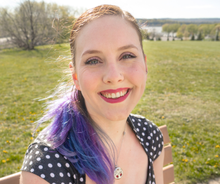
Dr. Lynne Sargent (PhD '22)
-PhD in Applied Philosophy
-Disability and technology consultant
Dr. Lynne Sargent's research focuses on what she defines as the "techno-inclusive model of disability," which has practical application for the ways that disabled people live their lives in digital and physical spaces.
Sargent completed a PhD in Applied Philosophy, a specialized program within the Department of Philosophy in the Faculty of Arts at the University of Waterloo.
"It was important to me that my PhD research had a practical element," she says. "Sometimes people don't think of philosophy as being so practical, but our program is exactly that."
More specifically, Sargent's research is in the field of applied ethics, which is interested in the ways that values and morality shape experience and how people live and relate to one another. Her project studied the ways that technology impacts disability.
Social and medical models of disability
"In disability studies, there are basically two models of disability: the medical model and the social model," Sargent says. "The medical model sees disability as a disease or as a problem to be solved, so to speak. Whereas the social model sees disability as something that is socially constructed and the result of biases and barriers that exclude disabled people from social life."
The social construction of disability happens through a combination of factors, which may include things like the built environment as well as social and cultural conventions that privilege able-bodied people over disabled people.
Sargent's research specifically looks at disability through the lens of technology, and the ways that tech can complicate both the medical and social models of disability. Disabled people, for example, might use devices or programs in particular ways, and there are specific apps and programs that can extend access to digital and physical spaces.
Techno-inclusive model of disability
That's not to say all technology is inherently liberatory from the perspective of disability. As Sargent points out, some technology is participating in the social or technological construction of disability, and this is something that innovators and creators need to be wary of.
"My dissertation was also looking at current policy in Ontario," she says. "I investigated the ways that disabled people access funding through the Ontario Disability Support Program, Ontario Works and a number of other programs. In the end, I make some recommendations of ways the current state of affairs here in Ontario could be meaningfully improved for disabled people."
As she explains, disability is not in the person and not in the environment per se. It is designed in the ways we structure our society, the ways we interact with one another and the tools we create, like the technological tools that are so important in the world today.
The need to do better
Analyzing the technological construction of disability shows what additional supports need to be made available and the way things can potentially be changed for the better.
"It's not enough just to provide people with wheelchairs," Sargent says. "Disabled people need to have access to screen-reading software, older adults need access to apps that can help remind them to take their medications. And so many of these things are left out the discussion of disability and accessibility today. The way technology impacts inclusivity needs to be front and centre if accessibility is going to be authentic."
Along with her work as an academic, Sargent is also exploring technology and futurism through her creative writing and in public forums, and offers consulting services through her company Type-Driven Consulting.
Read Sargent's dissertation, The Techno-Inclusive Model of Disability, on UWSpace.






